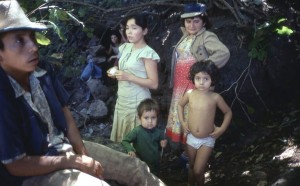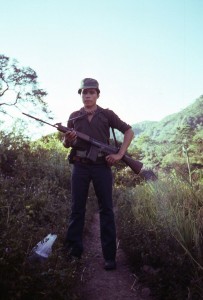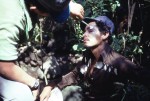Professor Philippe Bourgois trampled through miles of mud with about 1,500 Salvadoran natives to seek protection from the constant gunfire allegedly launched by the Salvadoran army on a stormy night in November 1981.
Years after the attack, the Central Intelligence Agency neither denies nor confirms existence of any records pertaining to the attack or Bourgois’ presence in El Salvador during the time, according to a lawsuit filed by the Center for Human Rights at the University of Washington and other affiliates.
The center filed a Freedom of Information Act lawsuit Friday against the CIA alleging the agency withheld information about Colonel Sigifredo Ochoa Pérez, who has been suspected of human-rights violations, including slaughtering hundreds of unarmed civilians and blocking humanitarian aid.
El Salvador’s civil war was a violent conflict between the military government of El Salvador and a coalition of guerrilla groups. The war, which lasted from 1980 until 1992, led to mass murders of civilians.
Ochoa Pérez, a retired El Salvador army officer, is also under criminal investigation in his own country for allegedly killing civilians, according to the lawsuit filed Friday.
The lawsuit also challenges the CIA’s failure to provide information about Bourgois, a visiting psychiatry and biobehavioral science professor at UCLA, who survived a 1981 massacre in Santa Cruz allegedly led by Perez.

According to the lawsuit, Perez was trained at the Inter-American Defense College in Washington, D.C., and adhered to the U.S.’ suggested wartime strategy. The lawsuit also alleges the U.S. provided about $5 billion in aid to El Salvador during its civil war and advised the Salvadoran military on counterinsurgency tactics.
Bourgois said he went to war-ridden El Salvador in 1981 as a graduate student looking to write his thesis on the violence in Central America.
“Reading anthropological accounts and theories about revolution made me question why certain people revolted and certain didn’t,” he said.
Bourgois said he started his research in the refugee camp La Virtud, operated by the United Nations High Commissioner for Refugees, in Honduras, about two miles from the El Salvadoran border.
“Somewhat naively, I decided to swim across the border into the guerrilla war camp set up by certain natives, curious to discover more,” he said.
The guerrilla camp operators gave Bourgois permission to ask the rebel leaders questions about the revolution and their intentions.
Bourgois said the local army started a search and destroy operation against unarmed civilians on the second night of his stay.
“They set out on foot to kill everyone and then burn houses, trample the crops and kill the livestock,” he said. “They wanted to ensure the entire region was inhabitable.”
Two days later, about 1,500 of the village natives, including Bourgois, escaped the region and returned to the refugee camp in Honduras.

“We were sure that if we ran through the lines of fire they wouldn’t be able to kill all of us,” he said.
Bourgois and village natives avoided foot soldiers and helicopter patrols during their 11-day journey to Honduras. The local rebel leaders gained access to radio-transmitted conversations of the Salvadoran military and used them to determine when it was safe to run from one safe spot to another, Bourgois added.
“On the last day, we hiked and swam through the lake overnight to get back to the refugee camp with safety,” he said. “About 1,000 of us made it back.”
Bourgois arrived at the refugee camp and immediately took a bus back to the airport and flew home.
Upon arrival in the U.S. in 1982, Bourgois testified before Congress about the crimes that were inflicted on the local Salvadoran population in what later became known as the massacre of Santa Cruz.
Bourgois said his testimony led to some attempts to pass legislation that would limit foreign aid to El Salvador, but all efforts were halted by President Ronald Reagan.
Bourgois added he and the University of Washington hope the lawsuit will enable them to obtain documents pertaining to the massacre in order to open up an official war crimes against humanity charge against Perez.
Director of the Center for Human Rights at the University of Washington Angelina Snodgrass Godoy said she thinks obtaining these documents will help Salvadoran survivors of human rights abuses further their cases in the country’s justice system.
“It’s good to see that people are taking interest to reopen an obscure moment in history and do justice for hundreds of people who suffered during this massacre,” Bourgois said.
